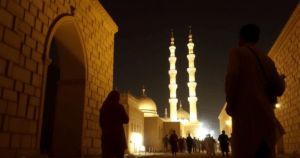Shocking Israeli Airstrikes Kill 35+ in Gaza on Eid – Crisis Worsens
Israeli airstrikes on Gaza killed dozens, including children, as Palestinians marked Eid al-Fitr. Bombs hit homes and tents sheltering displaced families, leaving many dead and injured. The humanitarian crisis is worsening, with food scarce and aid blocked since early March. Families struggle to afford basic necessities, turning what should be a joyous holiday into a time of despair. Meanwhile, the Palestine Red Crescent recovered 15 medical workers’ bodies after an Israeli attack in Rafah, calling it a “war crime.”
Ceasefire talks remain deadlocked as Netanyahu demands Hamas disarm and release hostages without guaranteeing an end to the war. He also voiced support for Trump’s controversial “voluntary emigration plan” for Palestinians. As bombings continue and diplomacy falters, Gaza faces one of its darkest humanitarian crises in history.

Shocking Israeli Airstrikes Kill 35+ in Gaza on Eid – Crisis Worsens
On the first day of Eid al-Fitr, a holiday marking the end of Ramadan, Israeli airstrikes struck residential areas and makeshift tents in Gaza, killing dozens of civilians, including children. The attacks targeted Rafah and Khan Younis, with medical sources reporting at least 35 deaths. Families celebrating the holiday were caught in the violence, and rescue workers later recovered the bodies of 15 medical personnel killed in a separate strike in Rafah. The Palestine Red Crescent Society (PRCS) condemned the attack as a “war crime.”
Humanitarian Crisis Worsens
Gaza’s humanitarian situation has deteriorated sharply. Israel’s blockade on aid since early March has led to severe food shortages and skyrocketing prices. Displaced families, many living in tents, struggled to observe Eid traditions, such as festive meals or buying new clothes for children. Ameneh Shaqla, a mother displaced by the conflict, shared her grief: “I could only bake a few cookies for my children. We have nothing left.” Street vendors reported that even simple Eid treats and clothing were unaffordable for most.
The Al-Mawasi area near Khan Younis, once declared a “safe zone” by Israel, was also bombed, killing 10 people and injuring 20. Survivors described horrific scenes, including children in Eid outfits among the victims. A man carrying an injured child to a hospital cried out, “What was their fault?” Thousands in Al-Mawasi now live in tents with little access to food, water, or medical care.
Ceasefire Talks Stall as Demands Shift
Efforts to negotiate a ceasefire have stalled. Israeli Prime Minister Benjamin Netanyahu insists Hamas must disarm, release all remaining hostages, and remove its leaders from Gaza before any truce can be reached. This stance marks a shift from a January agreement that linked hostage releases to phased Israeli troop withdrawals and permanent peace talks. Hamas rejected the new terms, calling disarmament a “red line” and insisting that any deal must guarantee aid restoration and a path to ending the war.
Netanyahu also endorsed a controversial “voluntary emigration plan” for Palestinians, initially proposed by former U.S. President Donald Trump, though details remain unclear. Hamas official Sami Abu Zuhri warned that such a policy would escalate violence, stating, “Netanyahu’s actions only prolong the conflict.”
Netanyahu Claims Military Pressure is “Working”
Despite international outcry, Netanyahu defended the intensified airstrikes, claiming they weaken Hamas and improve chances of hostage releases. “This strategy is crushing Hamas’ power and creating conditions to free our hostages,” he said. However, families of the 59 captives—35 of whom are feared dead—urged caution, fearing military action could endanger their loved ones.
Fragile Negotiations Continue
Hamas recently agreed to an Egyptian-mediated proposal to release five hostages weekly, including American-Israeli Edan Alexander, in exchange for increased aid and ceasefire negotiations. Israel countered with a U.S.-backed proposal, but key differences remain. Hamas demands guarantees that attacks will not resume after a truce, while Israel refuses to halt military operations until all hostages are freed.
A Region in Ruins
Gaza’s 2.3 million residents face unprecedented suffering. Hospitals, overwhelmed by casualties, lack essential supplies, while entire neighborhoods lie in ruins. The UN warns of famine as aid trucks remain blocked at border crossings. Ramadan, typically a time of community and prayer, ended in mourning as families buried their loved ones instead of sharing festive meals.
As violence persists, international calls for restraint grow louder. Yet with both sides entrenched in their positions, hope for peace continues to fade. For Palestinians in Gaza, survival remains a daily battle—one with no clear end in sight.
You must be logged in to post a comment.